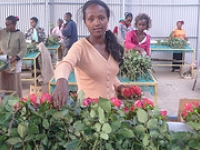Indian Rose Exporter Declares Bankruptcy in the Netherlands

A subsidiary of Karaturi Global, the Indian flower export multinational accused of land grabbing in Ethiopia and Kenya, has been declared bankrupt by a Dutch court. The company owes some $300,000 in the Netherlands, as well as upwards of $4 million in taxes in Kenya.
Over the last two decades, Sai Ram Karuturi transformed his family cable business in Bangalore into Karuturi Global under the motto "Let Millions of Roses Bloom." His company became famous as one of the leading examples of investors snapping up land in Africa. These companies grow crops for export, taking advantage of new laws that allow foreign companies to lease land directly instead of buying crops from local farmers.
At the height of his success, Karaturi became known as the Rose King when his company delivered 650 million roses a year to Europe. And just three years ago Sai Ram Karuturi of Karuturi Global was appointed honorary consul for Ethiopia in a formal ceremony conducted by Muktar Kedir, the Ethiopian cabinet affairs minister in Bangalore.
But the company has also been dogged by controversy for years. For example, Karuturi Global's concession in Gambela, Ethiopia, was investigated by New York-based Human Rights Watch May 2011 where they found that maize, sorghum, and groundnut crops planted by local Anuak farmers had been cleared without consent and residents moved off their land.
The Gambela project was also the subject of worker complaints with the Ethiopian Department of Labour and Social Welfare. "Workers complained their salaries were delayed by up to 20 days and said the company did not provide identity cards, safety equipment, medical treatment or proper residence," Beyane Assefa, a labor inspector, told the Hindu newspaper.
Then Karaturi business was hit badly when major flooding decimated its flower crop in 2011.
Last October, Francis Atwoli, secretary general of the Central Organisation of Trade Unions, accused Karuturi of failing to pay over 4,000 workers in Lake Naivasha in Kenya's Great Rift Valley for six months. Staff living in company quarters also had their electricity and water cut off for non-payment of bills.
"Despite this situation, the management is yet to show concern or institute any measures towards addressing the issue," Atwoli wrote urging that the government take action. "The minister for labour and his team are empowered by the Labour Act to arrest and prosecute such rogue employees."
A secondary school on the Naivasha farm was forced to shut down because of lack of money. "We have decided to take a break until our grievances are addressed as we cannot teach on empty stomachs," one teacher, who spoke on condition of anonymity, told AllAfrica.com.
By May 2014, Karaturi stopped shipping flowers to Flora-Holland. Late last month, Karuturi BV, a flower trading subsidiary in the Netherlands was declared bankrupt by a Haarlem court. Meanwhile, GRAIN, a sustainable agriculture activist group, reports that two Karaturi susbidiaries - Ethiopian Meadows Plc and Surya Blossoms Plc had been sold off.
Business Standard newspaper in India now reports that the company has postponed its annual shareholder meeting, stating that it does not have access to its financial reports in Kenya.
- 184 Labor



